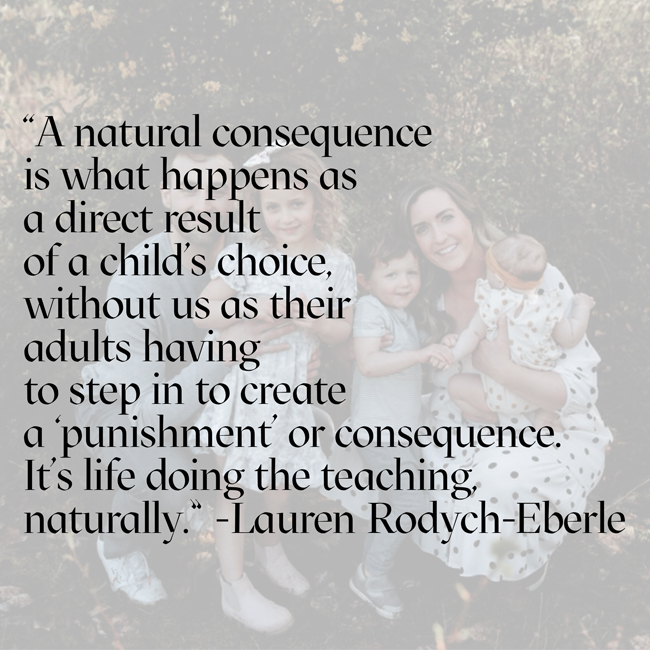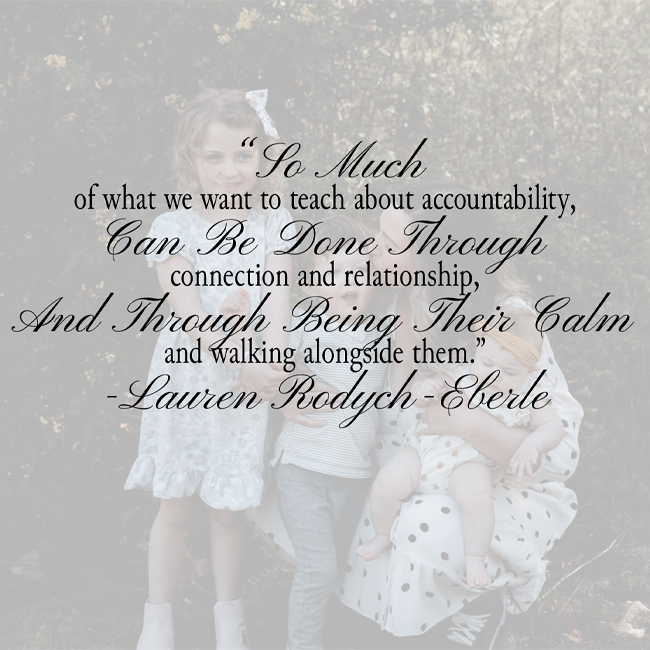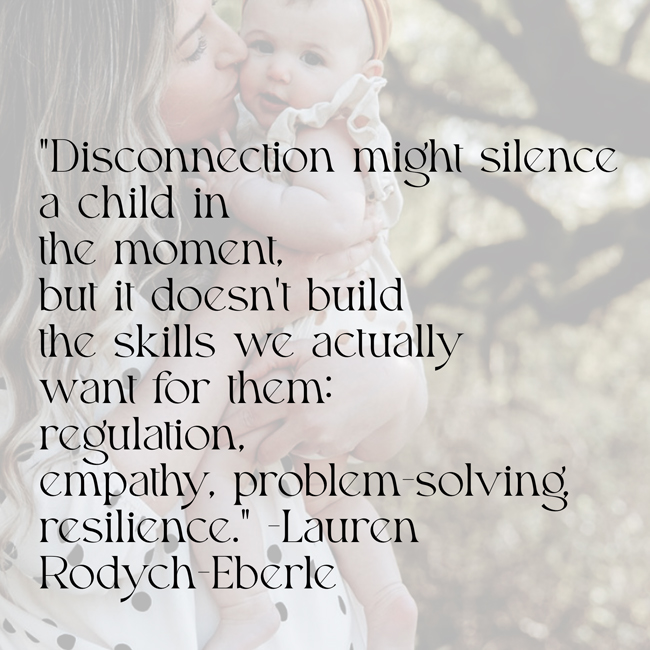There have been many times where people have asked me, “Do you give your children consequences?” Or with a surprise, “Oh! You do give consequences!” Or simply asking to explain what consequences look like when parenting in a conscious way.
The more I would dive into explaining ‘natural consequences,’ I’d have people talk about how sometimes natural consequences can be harder or more detrimental as kids age, or I’d find myself giving an example where I’d think, “hmm…that’s not really a natural consequence, but you know what it is? It’s logical.” So, that’s where I’m at as a parent and a Conscious Parenting Coach – I’m here for logical consequences to help guide and teach our children.
What is a Natural Consequence?
A natural consequence is what happens as a direct result of a child’s choice, without us as their adults having to step in to create a “punishment” or consequence. It’s life doing the teaching, naturally. Sometimes these natural consequences can be hard on us as parents to swallow, because it means sometimes our stuff gets ruined, our time has been wasted, or we feel pain seeing our children suffer from their choice. Please keep in mind, them experiencing a natural consequence shouldn’t come with a “I’m not going to help, or guide, or parent, and just let them figure it out the hard way” attitude, but rather a, “This is the point in the lesson where they will see it/experience it/feel it, and therefore, really get it!”
Some examples of a true natural consequence, would be:
- They leave a toy out in the yard, and it gets ruined.
- They don’t eat their meal, so they feel hungry.
- They spend all their allowance at the beginning of a trip, so they cannot buy anything they want later.
These moments gently guide our kids to understand cause and effect, while giving them room to grow and take ownership. With natural consequences, we often don’t need to teach anything – the experience teaches them. Therefore, no punishment is necessary, but some communication is always a good idea, to break down with your kids what happened and why.
Why Logical Consequences?
Now, let’s talk about why I switched to thinking about logical consequences. Because, many examples I heard from parents, or caregivers, or saw in my own children did not have a true natural consequence. On the other hand, punishing with shame and disconnection, although it might get quick ‘obedience,’ comes at a high cost. When we use shame, meaning we withdraw our love, raise our voice, or make a child feel “bad” for being human, we’re not teaching them how to make a better choice. We’re teaching them that their worth is tied to our approval and that our love for them is conditional. It teaches them that mistakes make them unlovable, which impacts all attachment for future relationships, makes them submissive, and likely gets them to hide their ‘failures’ from us. Disconnection might silence a child in the moment, but it doesn’t build the skills we actually want for them: regulation, empathy, problem-solving, resilience. And it often leaves them alone with big feelings that they were never meant to handle on their own. Don’t we all want a hug, or presence with those we love when we are feeling down or we messed up? We as adults don’t want to walk those roads alone, and neither do kids.
So much of what we want to teach about accountability, can be done through connection and relationship, and through being their calm and walking alongside them. For this reason, we also don’t want consequences that are not logical; consequences that don’t connect with what the child did. Mostly when we take away something from kids, or disconnect from them, all it does is make them mad at us, and it does not teach them what to do next time. This is why time-outs are not a great consequence – the child often sits alone and thinks about how angry they are at their caregiver, and they feel disconnected. Quick obedience may come, rather than long-term lessons. I also want to add that connection has the longest benefit – there comes an age when taking something away from our kids, or “punishing” them simply won’t do the trick anymore, but if the connection is strong, they will want to comply with our requests and work with us.
Here are some classic examples of illogical consequences:
- “You hit your sibling, so you don’t get dessert.”
- “You didn’t clean your room, so you’re grounded.”
- “You threw a toy in the house, so you need to sit alone in your room.”
What are the logical consequences that would replace those?:
- “You hit your sibling, and I can’t let you hurt others. Let’s calm down together and we can go check on your sibling.” [They learn how to regulate, how to repair, and then you can talk about what to do instead when that anger rises up in their body. This teaches them what to do next time, while a “punishment” will teach them that if they hit, they need to hide it from you].
- “You didn’t clean your room, and you need to have it cleaned before we go to the park with your friends. If it isn’t done in time, we won’t be able to go.” [They learn that certain responsibilities need to be completed before moving on to fun plans. It mirrors adult life—chores, commitments, and follow-through matter].
- “You threw a toy in the house. Toys are not for throwing. We can go throw a ball outside later. I need to take that toy away until you can learn to respect the toys and the house.” [You can evaluate when they can try again, but this teaches them what they can throw, and teaches them safety, respect, and follow through on boundaries].
I know…I know these logical consequences take more time and care as an adult than simply grounding, or sending them to time-out, or yelling, or punishing. But, we are parenting for the long-game, right? I don’t know about you, but I know that I want to know the “why” behind rules, and I want rules to make sense. I always love to throw out what this would look like for us as adults, so here are some that hopefully give you a little chuckle.
Examples of illogical consequences as adults:
- “You didn’t switch the laundry, so no Netflix for you tonight!”
- “You were 10 minutes late getting ready, so you don’t get to talk to your friends for a week.”
- “You left the lights on again, so I’m cancelling your birthday party.”
Obviously those sound funny and unrealistic, because they don’t go together! Laundry and Netflix don’t go together…the consequence of not getting the laundry done is having to do it again, not having the clothes you need, or losing time on something fun. So, can you imagine your spouse telling you the consequence or punishment for not getting the laundry done, was no Netflix whatsoever? You’d probably not only be mad, but you’d also be confused…and would that be what made you not forget the laundry next time? Or, would it just make you mad at your spouse? Logical matters!
How Can We Guide?
I want to reiterate a little bit more about why we are moving to logical consequences, beyond keeping connection and truly teaching. Part of it is because some natural consequences are too delayed or too unsafe.
The natural consequence of not brushing teeth repeatedly is too delayed, so we do need to teach them, guide them, and likely find ways to make it fun or make it a game for the younger ages, on the spot. The natural consequence of running into the street is not a consequence anyone wants to learn. So, we need to teach responsibility in a supportive way, and guide them to be safe until they are ready to take that responsibility on themselves.
When the action is more emotional, than physical, we can still hold a boundary, or a logical consequence. For example, we can say, “I don’t feel like talking when I’m spoken to in that way. Can you try that again?/Can you ask me another way?/I think you can find another way to say that that’s kinder.”
As Children’s Guides:
- We can communicate before, during, and after.
- We can narrate what we notice(d) – another form of communication
- We can let them make the choice, while allowing them to prepare. For example, if they don’t want to wear a coat, and the natural consequence is that they will get cold, we can guide them to listen to their body while also telling them they need to bring a coat along, so they can have a backup option.
In many cases, pure natural consequences aren’t always practical. And punishment (in the modern sense of the meaning) does not meet our long-term goals. When possible, allowing kids to experience the natural result (in a safe way) helps them to develop problem-solving skills and self-awareness. And being there to set boundaries, implement logical consequences, and continue to guide as needed – that’s the beautiful role we’re so blessed to play as parents.
Happy Conscious Parenting!



